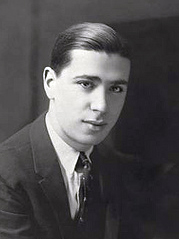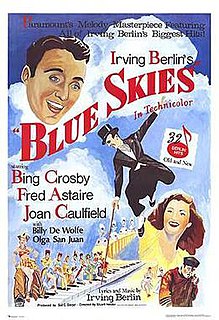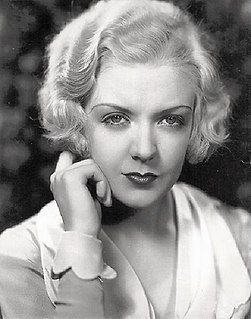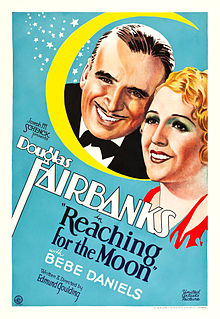
Holiday Inn is a 1942 American musical film starring Bing Crosby and Fred Astaire, with Marjorie Reynolds, Virginia Dale, and Walter Abel. It was directed by Mark Sandrich with music by Irving Berlin. The composer wrote twelve songs specifically for the film, the best known being "White Christmas". The film features a complete reuse of the song "Easter Parade", written by Berlin for the 1933 Broadway revue As Thousands Cheer and used as a highlight of the 1948 film, Easter Parade starring Astaire and Judy Garland. The film's choreography was by Danny Dare.

John Francis Burke was an American lyricist, successful and prolific between the 1920s and 1950s. His work is considered part of the Great American Songbook.

Sam Coslow was an American songwriter, singer, film producer, publisher and market analyst. Coslow was born in New York City. He began writing songs as a teenager. He contributed songs to Broadway revues, formed the music publishing company Spier and Coslow with Larry Spier and made a number of recordings as a performer.

Blue Skies is a 1946 American musical comedy film directed by Stuart Heisler and starring Bing Crosby, Fred Astaire, and Joan Caulfield. Based on a story by Irving Berlin, the film is about a dancer who loves a showgirl who loves a compulsive nightclub-opener who can't stay committed to anything in life for very long. Produced by Sol C. Siegel, Blue Skies was filmed in Technicolor and released by Paramount Pictures. The music, lyrics, and story were written by Irving Berlin, with most of the songs recycled from earlier works.
"Blue Skies" is a popular song, written by Irving Berlin in 1926.
"There's No Business Like Show Business" is an Irving Berlin song, written for the 1946 musical Annie Get Your Gun and orchestrated by Ted Royal. The song, a slightly tongue-in-cheek salute to the glamour and excitement of a life in show business, is sung in the musical by members of Buffalo Bill's Wild West Show in an attempt to persuade Annie Oakley to join the production. It is reprised three times in the musical.

June Mary MacCloy was an American actress and singer in the 1930s and 1940s.

White Christmas is a 1954 American musical film directed by Michael Curtiz and starring Bing Crosby, Danny Kaye, Rosemary Clooney, and Vera-Ellen. Filmed in Technicolor, it features the songs of Irving Berlin, including a new version of the title song, "White Christmas", introduced by Crosby in the 1942 film Holiday Inn.

"White Christmas" is an Irving Berlin song reminiscing about an old-fashioned Christmas setting. The song was written by Berlin for the musical film Holiday Inn, released in 1942. The composition won the Academy Award for Best Original Song at the 15th Academy Awards.

"Swanee" is an American popular song written in 1919 by George Gershwin, with lyrics by Irving Caesar. It is most often associated with singer Al Jolson.

Going Hollywood is a 1933 American pre-Code musical film directed by Raoul Walsh and starring Marion Davies and Bing Crosby. It was written by Donald Ogden Stewart and based on a story by Frances Marion. Going Hollywood was released by Metro-Goldwyn-Mayer on December 22, 1933.
"They Say It's Wonderful" is a popular song written by Irving Berlin for the musical Annie Get Your Gun (1946), where it was introduced by Ethel Merman and Ray Middleton. A film version in 1950 again featured the song when it was performed by Howard Keel and Betty Hutton. More recently it was performed in an episode of The Marvelous Mrs. Maisel by Darius de Haas.
"Just One of Those Things" is a popular song written by Cole Porter for the 1935 musical Jubilee.

Sing You Sinners is a 1938 American musical comedy film directed by Wesley Ruggles and starring Bing Crosby, Fred MacMurray, Ellen Drew, and Donald O'Connor. Written by Claude Binyon, the film is about three singing brothers who go to California to find their fortune. Initially the film was to be titled "The Unholy Beebes" and then "Harmony for Three" before finishing with "Sing You Sinners". Filming took place in April/May 1938 in Hollywood. Race track scenes were filmed at the Pomona Fairgrounds and at Santa Anita using two dozen of Crosby's horses. Sing You Sinners was premiered on August 5, 1938 at the Del Mar racetrack with the New York premiere taking place on August 16.
"How Deep Is the Ocean?" is a popular song written by Irving Berlin in 1932. The song was developed from an earlier Berlin song "To My Mammy" which was sung by Al Jolson in his film Mammy (1930). In the earlier song, the lyrics include the questions "How deep is the ocean? / How high is the sky?" and this was the genesis of "How Deep Is the Ocean?".
"Isn't This a Lovely Day?" is a popular song written by Irving Berlin for the 1935 film Top Hat, where it was introduced by Fred Astaire in the scene where his and Ginger Rogers' characters are caught in a gazebo during a rainstorm. The lyric is an example of a song which turns a bad situation into a love song, a common style for Irving Berlin, as in I've Got My Love to Keep Me Warm and Let's Have Another Cup of Coffee.
"Reaching for the Moon" is a popular song written by Irving Berlin for the 1930 musical film of the same name.

Swing jazz emerged as a dominant form in American music, in which some virtuoso soloists became as famous as the band leaders. Key figures in developing the "big" jazz band included bandleaders and arrangers Count Basie, Cab Calloway, Jimmy and Tommy Dorsey, Duke Ellington, Benny Goodman, Fletcher Henderson, Earl Hines, Glenn Miller, and Artie Shaw. Duke Ellington and his band members composed numerous swing era hits that have become standards: "It Don't Mean a Thing " (1932), "Sophisticated Lady" (1933) and "Caravan" (1936), among others. Other influential bandleaders of this period were Benny Goodman and Count Basie.

Mr. Music is a 1950 film starring Bing Crosby and Nancy Olson, directed by Richard Haydn, and released by Paramount Pictures. It is based on the play Accent on Youth written by Samson Raphaelson. Filming took place from October to December 1949 in Hollywood.

The Star Maker is a 1939 American musical film directed by Roy Del Ruth, written by Frank Butler, Don Hartman and Arthur Caesar, and starring Bing Crosby, Louise Campbell, Linda Ware, Ned Sparks, Laura Hope Crews, Janet Waldo and Walter Damrosch. Filming started in Hollywood on April 17, 1939 and was finished in June. The film was released on August 25, 1939, by Paramount Pictures, and had its New York premiere on August 30, 1939. It was the only film in which Crosby played a happily married man.













